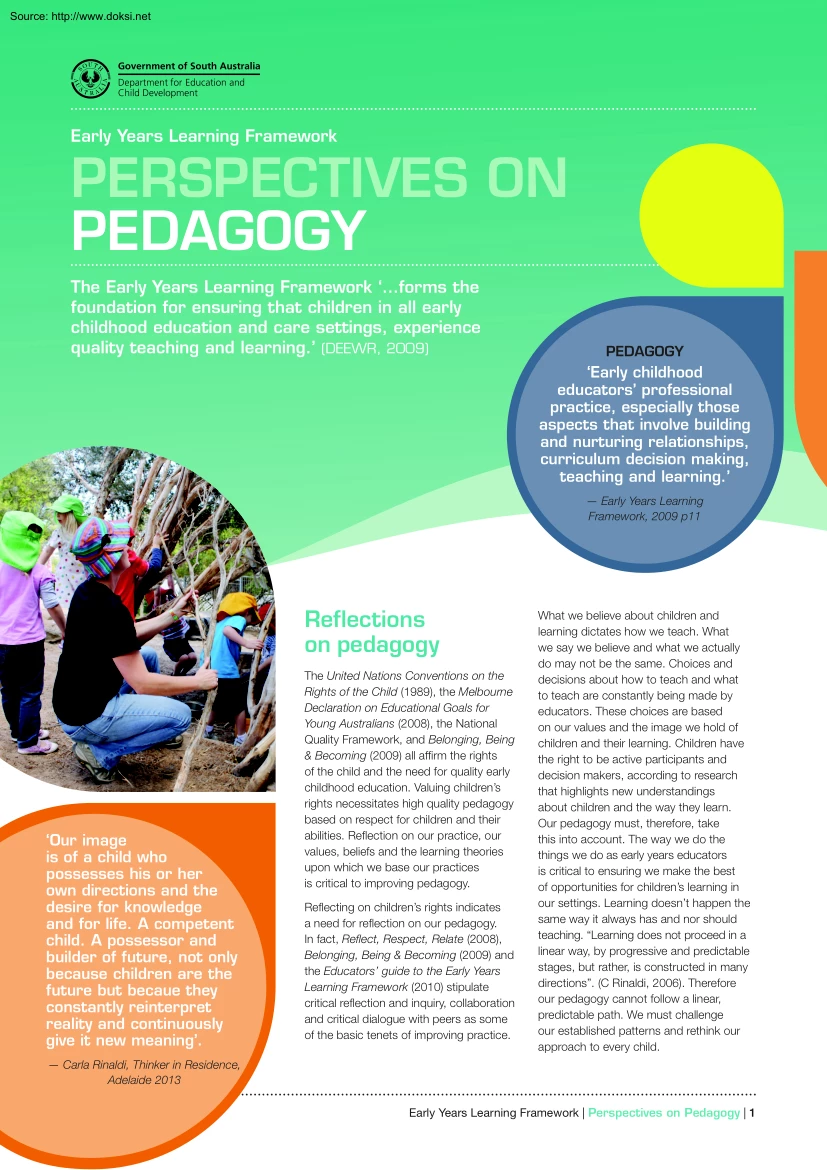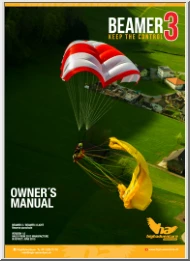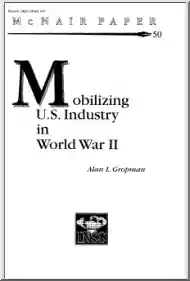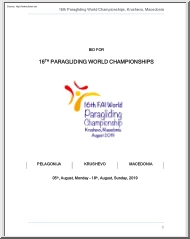Please log in to read this in our online viewer!

Please log in to read this in our online viewer!
| Anonymus | November 15, 2023 | |
|---|---|---|
| Interesting. | ||
What did others read after this?
Content extract
Source: http://www.doksinet Early Years Learning Framework PERSPECTIVES ON PEDAGOGY The Early Years Learning Framework ‘forms the foundation for ensuring that children in all early childhood education and care settings, experience quality teaching and learning.’ (DEEWR, 2009) PEDAGOGY ‘Early childhood educators’ professional practice, especially those aspects that involve building and nurturing relationships, curriculum decision making, teaching and learning.’ Early Years Learning Framework, 2009 p11 Reflections on pedagogy ‘Our image is of a child who possesses his or her own directions and the desire for knowledge and for life. A competent child. A possessor and builder of future, not only because children are the future but becaue they constantly reinterpret reality and continuously give it new meaning’. The United Nations Conventions on the Rights of the Child (1989), the Melbourne Declaration on Educational Goals for Young Australians (2008), the National
Quality Framework, and Belonging, Being & Becoming (2009) all affirm the rights of the child and the need for quality early childhood education. Valuing children’s rights necessitates high quality pedagogy based on respect for children and their abilities. Reflection on our practice, our values, beliefs and the learning theories upon which we base our practices is critical to improving pedagogy. Reflecting on children’s rights indicates a need for reflection on our pedagogy. In fact, Reflect, Respect, Relate (2008), Belonging, Being & Becoming (2009) and the Educators’ guide to the Early Years Learning Framework (2010) stipulate critical reflection and inquiry, collaboration and critical dialogue with peers as some of the basic tenets of improving practice. What we believe about children and learning dictates how we teach. What we say we believe and what we actually do may not be the same. Choices and decisions about how to teach and what to teach are constantly being
made by educators. These choices are based on our values and the image we hold of children and their learning. Children have the right to be active participants and decision makers, according to research that highlights new understandings about children and the way they learn. Our pedagogy must, therefore, take this into account. The way we do the things we do as early years educators is critical to ensuring we make the best of opportunities for children’s learning in our settings. Learning doesn’t happen the same way it always has and nor should teaching. “Learning does not proceed in a linear way, by progressive and predictable stages, but rather, is constructed in many directions”. (C Rinaldi, 2006) Therefore our pedagogy cannot follow a linear, predictable path. We must challenge our established patterns and rethink our approach to every child. Carla Rinaldi, Thinker in Residence, Adelaide 2013 Early Years Learning Framework | Perspectives on Pedagogy | 1 Source:
http://www.doksinet What does pedagogy look like? Educators making connections with children, families and each other through positive relationships and contextual curriculum decision making to guide their teaching and learning. Pedagogy will look different in different contexts and rightly so. We will learn from and with children as researchers together. Our research, reflections, documentation and learning must shape our pedagogy. As social constructivists our practices are culturally and contextually situated and therefore change with each and every child and family. Inquiry: What beliefs or theories drive your practice? What practical aspects of pedagogy are highly effective in your context? What aspects need re-thinking or changing? Foremost in examining critical aspects of pedagogy are relationships. Nurturing, respectful relationships requires ‘A child requires progressively more complex joint activity with one or more adults who have anemotional relationship with the child.
Somebody’s got to be crazy about that kid. That’s number one. First, last and always’ (Bronfenbrenner in National Scientific Council on the Developing Child 2004, quoted in RRR p12, 2008) • allowing children to ‘just be’ – respecting children’s timing and rhythms, valuing childhood as an important part of life, recognising the security in belonging and the excitement in becoming • educators engaged in shared, sustained talking time – sitting and playing with children for extended periodstalking, laughing, listening, observing, connecting and learning together, both individually and in groups • culturally competent educators with passion and enthusiasm National Quality Standard ‘Quality Area 1 provides a strong focus on enhancing children’s learning and development through the pedagogical practices of educators.’ Guide to the National Quality Standard, 2011 p20 • responsiveness to children’s rights, ideas, interests, strengths and culture •
children, parents, educators and communities working together as partners to maximise learning • children choosing what they engage and play with, when and for how long • high expectations – encouraging, supporting and challenging children’s learning • environments that reflect and respect attitudes and the joys, delights and culture of communities. 2 | Early Years Learning Framework | Perspectives on Pedagogy Curriculum decision making requires ‘Curriculum in the early childhood settingmeans all the interactions, experiences, activities, routines and events, planned and unplanned that occur in an environment designed to foster children’s learning and development.’ (EYLF, DEEWR, 2009, adapted from Te Whariki) Source: http://www.doksinet • collaborative decision making – where parents, children and educators talk together, plan, reflect, evaluate and assess • rich environments offering exciting possibilities and filled with wonder and curiosity • planning
for children to engage in deep extended play, by themselves, with peers and with educators • flexible routines and structures, both outdoor and indoor which support play and learning • an inclusive, dynamic, co-constructed learning environment • an aesthetically pleasing environment with spaces that motivate and stimulate investigation and exploration and result in a sense of security and wellbeing • educators to make learning visible through regular, ongoing, reflective pedagogical documentation that supports and improves learning and teaching and allows children, families and educators to revisit the learning and make the process of learning visible • an understanding of the theories behind your decisions about the most effective way to enact the ‘art of teaching’ in your context, including an understanding of the implications of current research • an understanding of individual children and a knowledge of the context of families and community • educators who move
flexibly between situations and roles and utilise different strategies to engage with children • thoughtful documentation of children’s learning with analysis, reflection and future planning • encouraging creativity, intuition and imagination in educators and children. • an understanding of the content and intent of the Early Years Learning Framework, including the five outcomes, the Principles and the Practices • a focus on dispositions, with the development of skills and concepts that are relevant to each child • an integration of literacy and numeracy-specific skills to each child in an holistic way • intentional teaching which maximises every child-initiated opportunity for learning and is specific to each child and the moment Reflect, Respect, Relate ‘.provides a guide for educators to critically reflect on their pedagogy and relationships with children.’ RRR, an overview, 2010 • active promotion of learning through worthwhile and challenging experiences
• flexible, individualised planning that is responsive to children’s interest, ideas, culture, strengths and rights. Teaching and learning requires ‘Intentional teaching involves educators being deliberate, thoughtful and purposeful in their decisions and actions.’ (EYLF, DEEWR, 2009) ‘Learning is a natural process of exploration that children engage in from birth as they expand their intellectual, physical, social, emotional and creative capacities.’ (EYLF, DEEWR, 2009) Early Years Learning Framework | Perspectives on Pedagogy | 3 Source: http://www.doksinet Quality pedagogy is highly effective when aspects of early years education are holistic, connected and: Quality pedagogy is less effective when aspects of early years education: • children’s rights to quality learning drive the curriculum – where the child and the family have a strong, authentic voice • ideas for experiences and learning opportunities arise from children and families’ interests,
curiosity, culture • all learning is relevant and meaningful to children • educators listen to children’s desires and interests in collaborating on routines References • are independently planned by the educator • are inflexiblebased on educators’ agendas, or the weather • expect all children to complete the same work/activity • are solely based on themes • have irrelevant or meaningless tasks, activities or experiences Guide to the National Quality Standard, DEEWR, 2011 Belonging, Being & Becoming, The Early Years Learning Framework for Australia, DEEWR, 2009 Educators’ guide to the Early Years Learning Framework, DEEWR, 2010 Reflect, Respect, Relate DECS 2008 Competent children at 14, Wylie et al NZCER, 2006 • adult involvement is purposeful, considered and deliberate • have adults directing or supervising involvement • children develop curiosity, confidence, imagination and explore and have fun during extended periods of learning through play •
are controlling of children’s play – which is brief rather than long and deep Beyond quality in early childhood education and care; postmodern perspectives, Dahlberg, Moss & Pence, 1999 • incidental and planned group times happen on many occasions, both inside and out and learning is supported at every opportunity • are focused on talking rather than doing – long, large group times with educators talking and where more time is spent on rules than learning Researching effective pedagogy in the early years, Siraj-Blatchford et al, 2002 • flexible use of resources both natural and man-made offer a diverse range of learning possibilities • regularly use worksheets, templates or structured activities with ‘limited use’ resources • formative assessment is critical in supporting children’s learning • pedagogical documentation includes analysis, reflection and plans for future learning • collect scrapbooks of children’s artwork or the day’s events or
photos with no assessment, reflection or evaluation of learning • children’s behaviours are supported sensitively and in a caring manner with a focus on wellbeing and learning • isolate children from peers and role models from whom they could learn or think about their behaviour • use discipline rather than support or guidance when responding to children’s behaviour • literacy and numeracy skills and concepts are developed and enhanced in an holistic manner • there is a narrow focus on literacy or numeracy that looks the same for all children • technology is an integrated part of an holistic learning environment. • use technology as a reward or punishment. Pedagogy, Leach and Moon, 2008 Melbourne Declaration on Educational Goals for Young Australians, MCEETYA December, 2008 In Dialogue with Reggio Emilia Listening, researching and learning. C Rinaldi, 2006 The perspectives on pedagogy shared in this paper align with the intent of the Early Years Learning
Framework and the National Quality Standard. DECD Early Learning and Quality Reform 2013 Further copies are available from www.earlyyearssaeduau 4 | Early Years Learning Framework | Perspectives on Pedagogy
Quality Framework, and Belonging, Being & Becoming (2009) all affirm the rights of the child and the need for quality early childhood education. Valuing children’s rights necessitates high quality pedagogy based on respect for children and their abilities. Reflection on our practice, our values, beliefs and the learning theories upon which we base our practices is critical to improving pedagogy. Reflecting on children’s rights indicates a need for reflection on our pedagogy. In fact, Reflect, Respect, Relate (2008), Belonging, Being & Becoming (2009) and the Educators’ guide to the Early Years Learning Framework (2010) stipulate critical reflection and inquiry, collaboration and critical dialogue with peers as some of the basic tenets of improving practice. What we believe about children and learning dictates how we teach. What we say we believe and what we actually do may not be the same. Choices and decisions about how to teach and what to teach are constantly being
made by educators. These choices are based on our values and the image we hold of children and their learning. Children have the right to be active participants and decision makers, according to research that highlights new understandings about children and the way they learn. Our pedagogy must, therefore, take this into account. The way we do the things we do as early years educators is critical to ensuring we make the best of opportunities for children’s learning in our settings. Learning doesn’t happen the same way it always has and nor should teaching. “Learning does not proceed in a linear way, by progressive and predictable stages, but rather, is constructed in many directions”. (C Rinaldi, 2006) Therefore our pedagogy cannot follow a linear, predictable path. We must challenge our established patterns and rethink our approach to every child. Carla Rinaldi, Thinker in Residence, Adelaide 2013 Early Years Learning Framework | Perspectives on Pedagogy | 1 Source:
http://www.doksinet What does pedagogy look like? Educators making connections with children, families and each other through positive relationships and contextual curriculum decision making to guide their teaching and learning. Pedagogy will look different in different contexts and rightly so. We will learn from and with children as researchers together. Our research, reflections, documentation and learning must shape our pedagogy. As social constructivists our practices are culturally and contextually situated and therefore change with each and every child and family. Inquiry: What beliefs or theories drive your practice? What practical aspects of pedagogy are highly effective in your context? What aspects need re-thinking or changing? Foremost in examining critical aspects of pedagogy are relationships. Nurturing, respectful relationships requires ‘A child requires progressively more complex joint activity with one or more adults who have anemotional relationship with the child.
Somebody’s got to be crazy about that kid. That’s number one. First, last and always’ (Bronfenbrenner in National Scientific Council on the Developing Child 2004, quoted in RRR p12, 2008) • allowing children to ‘just be’ – respecting children’s timing and rhythms, valuing childhood as an important part of life, recognising the security in belonging and the excitement in becoming • educators engaged in shared, sustained talking time – sitting and playing with children for extended periodstalking, laughing, listening, observing, connecting and learning together, both individually and in groups • culturally competent educators with passion and enthusiasm National Quality Standard ‘Quality Area 1 provides a strong focus on enhancing children’s learning and development through the pedagogical practices of educators.’ Guide to the National Quality Standard, 2011 p20 • responsiveness to children’s rights, ideas, interests, strengths and culture •
children, parents, educators and communities working together as partners to maximise learning • children choosing what they engage and play with, when and for how long • high expectations – encouraging, supporting and challenging children’s learning • environments that reflect and respect attitudes and the joys, delights and culture of communities. 2 | Early Years Learning Framework | Perspectives on Pedagogy Curriculum decision making requires ‘Curriculum in the early childhood settingmeans all the interactions, experiences, activities, routines and events, planned and unplanned that occur in an environment designed to foster children’s learning and development.’ (EYLF, DEEWR, 2009, adapted from Te Whariki) Source: http://www.doksinet • collaborative decision making – where parents, children and educators talk together, plan, reflect, evaluate and assess • rich environments offering exciting possibilities and filled with wonder and curiosity • planning
for children to engage in deep extended play, by themselves, with peers and with educators • flexible routines and structures, both outdoor and indoor which support play and learning • an inclusive, dynamic, co-constructed learning environment • an aesthetically pleasing environment with spaces that motivate and stimulate investigation and exploration and result in a sense of security and wellbeing • educators to make learning visible through regular, ongoing, reflective pedagogical documentation that supports and improves learning and teaching and allows children, families and educators to revisit the learning and make the process of learning visible • an understanding of the theories behind your decisions about the most effective way to enact the ‘art of teaching’ in your context, including an understanding of the implications of current research • an understanding of individual children and a knowledge of the context of families and community • educators who move
flexibly between situations and roles and utilise different strategies to engage with children • thoughtful documentation of children’s learning with analysis, reflection and future planning • encouraging creativity, intuition and imagination in educators and children. • an understanding of the content and intent of the Early Years Learning Framework, including the five outcomes, the Principles and the Practices • a focus on dispositions, with the development of skills and concepts that are relevant to each child • an integration of literacy and numeracy-specific skills to each child in an holistic way • intentional teaching which maximises every child-initiated opportunity for learning and is specific to each child and the moment Reflect, Respect, Relate ‘.provides a guide for educators to critically reflect on their pedagogy and relationships with children.’ RRR, an overview, 2010 • active promotion of learning through worthwhile and challenging experiences
• flexible, individualised planning that is responsive to children’s interest, ideas, culture, strengths and rights. Teaching and learning requires ‘Intentional teaching involves educators being deliberate, thoughtful and purposeful in their decisions and actions.’ (EYLF, DEEWR, 2009) ‘Learning is a natural process of exploration that children engage in from birth as they expand their intellectual, physical, social, emotional and creative capacities.’ (EYLF, DEEWR, 2009) Early Years Learning Framework | Perspectives on Pedagogy | 3 Source: http://www.doksinet Quality pedagogy is highly effective when aspects of early years education are holistic, connected and: Quality pedagogy is less effective when aspects of early years education: • children’s rights to quality learning drive the curriculum – where the child and the family have a strong, authentic voice • ideas for experiences and learning opportunities arise from children and families’ interests,
curiosity, culture • all learning is relevant and meaningful to children • educators listen to children’s desires and interests in collaborating on routines References • are independently planned by the educator • are inflexiblebased on educators’ agendas, or the weather • expect all children to complete the same work/activity • are solely based on themes • have irrelevant or meaningless tasks, activities or experiences Guide to the National Quality Standard, DEEWR, 2011 Belonging, Being & Becoming, The Early Years Learning Framework for Australia, DEEWR, 2009 Educators’ guide to the Early Years Learning Framework, DEEWR, 2010 Reflect, Respect, Relate DECS 2008 Competent children at 14, Wylie et al NZCER, 2006 • adult involvement is purposeful, considered and deliberate • have adults directing or supervising involvement • children develop curiosity, confidence, imagination and explore and have fun during extended periods of learning through play •
are controlling of children’s play – which is brief rather than long and deep Beyond quality in early childhood education and care; postmodern perspectives, Dahlberg, Moss & Pence, 1999 • incidental and planned group times happen on many occasions, both inside and out and learning is supported at every opportunity • are focused on talking rather than doing – long, large group times with educators talking and where more time is spent on rules than learning Researching effective pedagogy in the early years, Siraj-Blatchford et al, 2002 • flexible use of resources both natural and man-made offer a diverse range of learning possibilities • regularly use worksheets, templates or structured activities with ‘limited use’ resources • formative assessment is critical in supporting children’s learning • pedagogical documentation includes analysis, reflection and plans for future learning • collect scrapbooks of children’s artwork or the day’s events or
photos with no assessment, reflection or evaluation of learning • children’s behaviours are supported sensitively and in a caring manner with a focus on wellbeing and learning • isolate children from peers and role models from whom they could learn or think about their behaviour • use discipline rather than support or guidance when responding to children’s behaviour • literacy and numeracy skills and concepts are developed and enhanced in an holistic manner • there is a narrow focus on literacy or numeracy that looks the same for all children • technology is an integrated part of an holistic learning environment. • use technology as a reward or punishment. Pedagogy, Leach and Moon, 2008 Melbourne Declaration on Educational Goals for Young Australians, MCEETYA December, 2008 In Dialogue with Reggio Emilia Listening, researching and learning. C Rinaldi, 2006 The perspectives on pedagogy shared in this paper align with the intent of the Early Years Learning
Framework and the National Quality Standard. DECD Early Learning and Quality Reform 2013 Further copies are available from www.earlyyearssaeduau 4 | Early Years Learning Framework | Perspectives on Pedagogy




